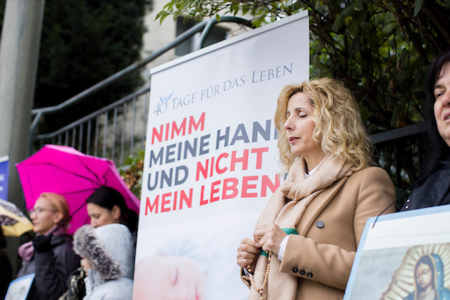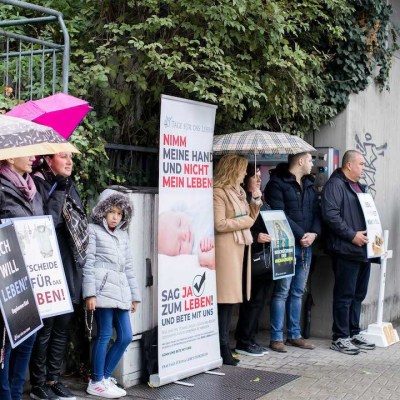German court upholds ban on prayer vigils near Planned Parenthood-affiliated abortion organization

A German court has upheld a ban on silent prayer gatherings near organizations that promote abortion, dismissing a prayer leader’s challenge to have the vigil restrictions lifted.
In 2019, a chapter of the global pro-life organization 40 Days for Life was banned from holding prayer vigils near the Pro Familia in Pforzheim, which is the German affiliate of the International Planned Parenthood Federation, a multi-billion dollar abortion organization.
40 Days for Life challenged the court’s ban since it restricts their right to freedom of religion, assembly and speech, Alliance Defending Freedom International, a faith-based legal advocacy group, reported.
The German court dismissed the pro-life group’s challenge on May 12, so the prayer vigils remain prohibited.

Pavica Vojnović, the pro-life prayer group’s leader, led 40-day vigils twice a year with around 20 people outside the pre-abortion advisery facility to pray for the women considering abortion and their pre-born children.
Even though Vojnović had been granted the necessary permissions to hold the vigils, the municipality has banned the group from praying near the facility for the past two years.
Pro Familia, Germany’s leading sexual and reproductive health and abortion rights organization, demanded the vigils be banned altogether or moved further away, even though the silent and peaceful vigils didn't prevent anyone from entering the building, and the police found no violations of the law.
“Every life is valuable and deserves protection,” Vojnović said in a statement. “I am shocked that we are being prevented from supporting vulnerable women and their unborn children in prayer."
"It’s discouraging to hear that silent prayer vigils in a public place are restricted by local authorities," she continued. "Our society must offer better support to mothers in difficult situations. This topic really touches my heart, because I’ve stood by many women who have suffered the pain of losing a child.”
Vojnović plans to continue the fight to restore her rights to freedom of religion, assembly and speech in court through the assistance of ADF International.
“This is about more than our group in Pforzheim. It’s about whether prayer-free zones are lawful, or whether one is allowed to represent different opinions in the public square,” Vojnović said. “That is why we want to continue fighting for this freedom.”
Felix Böllmann, legal counsel for ADF International, said they regret the court’s decision.
“We are still awaiting the reasoning for the verdict, but it is obvious the dismissal of the case fails to affirm freedom of expression, which is the foundation of every free and fair democracy,” Böllmann said in a statement.
“What kind of society restricts prayer for vulnerable women and children? By prohibiting even silent prayer near an abortion organization, the Pforzheim authorities have gone beyond what could be considered reasonable or proportionate,” Böllmann continued. “Whether or not people agree with Pavica’s views on the sanctity of life, everyone can support the importance of the fundamental rights to freedom of expression, religion, and assembly.”
The issue of "buffer zones" near abortion organizations is also a concern in the United States. In January, the U.S. Supreme Court rejected a pro-life group's challenge to a 15-foot buffer zone from abortion clinic entrances in Pittsburgh, Pennsylvania.
Censorship of pro-life organizations is also on the rise across Europe, from banned speech zones to college campuses.
In November 2020, Julie Rynkiewicz, a midwifery student and president of the anti-abortion organization “Nottingham Students for Life,” faced a suspension from United Kingdom’s Nottingham University and faced a four-month fitness-to-practice investigation.
The university eventually offered a settlement, but Rynkiewicz said her education was put on hold for an “unjust investigation” where she believes she was targeted for her pro-life beliefs, ADF International reported.
“Of all places, university is where students should be free to debate and explore ideas – especially those with which they disagree,” Ryan Christopher, director of ADF International said in a statement. “I’m pleased that with this settlement, Nottingham University recognized errors that were made in pursuing Julia, who simply wanted to live out her pro-life convictions. … A culture of vibrant discussion and free debate must be restored to our universities. Today’s censorial culture on campus can easily become cancel culture in the public square.”
ADF U.K. wrote a letter to Prime Minister Boris Johnson in February urging him to strengthen academic freedom and free speech at universities.
Emily Wood is a reporter for The Christian Post. She can be reached at: [email protected]






















